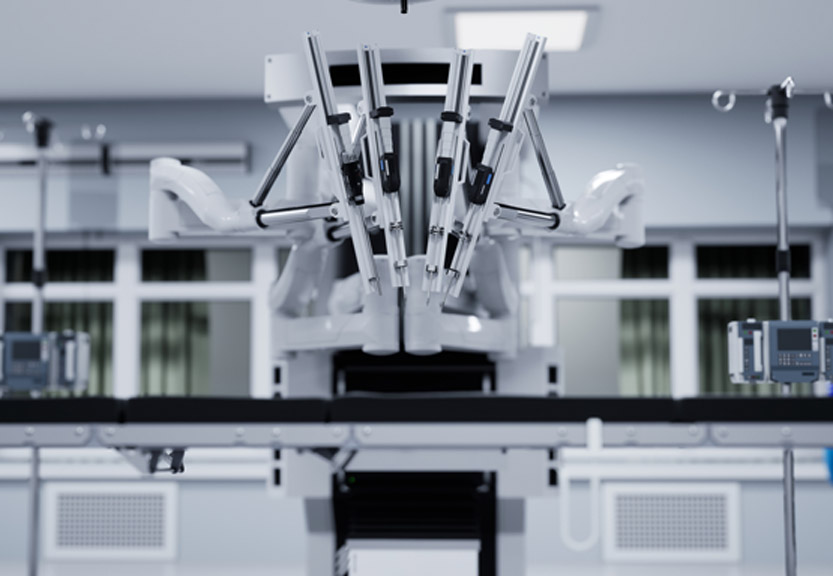

Robot-assisted prostate surgery is a minimally invasive procedure performed with the assistance of advanced surgical technology.
Robotic Surgery System
Robot-assisted prostate surgery is performed using the da Vinci® Surgical System, which is a sophisticated robotic surgery system that allows surgeons to operate on the prostate with enhanced vision, control, and accuracy.

What to Expect During Robotic Prostate Surgery
Using the advanced surgical system, the surgeon will pass miniaturized robotic instruments through several small keyhole incisions in the patient’s abdomen. This will allow the surgeon to remove the prostate and nearby tissues with great accuracy. This form of surgery is much less invasive than a conventional open radical retropubic prostatectomy, which requires making an abdominal incision that extends from the belly button to the pubic bone.
During robot-assisted prostate surgery, the surgeon uses a three-dimensional endoscope and image processing equipment to provide a magnified view of delicate structures surrounding the prostate gland, allowing optimal preservation of vital structures. The surgeon eventually removes the prostate through one of the keyhole incisions.
During surgery, the surgeon sits at a computer console and manipulates tiny wristed instruments that offer a range of motion far greater than the human wrist.
Benefits of Robotic Surgery
Compared with traditional open surgery, patients who undergo robot-assisted prostate surgery experience:
- Minimal blood loss – The number of men who require a blood transfusion is less than 0.2% in Dr. Lee’s procedures.
- Minimal pain – Most men require little more than Tylenol once they are home from the hospital.
- Outpatient procedure – Dr. Lee’s experience has allowed patients to go home the same day with a minimum of pain. He encourages men to start walking as much as possible the next morning and patients can usually take their routine diet by the next morning.
- Faster recovery times – Dr. Lee encourages men to walk even one to two miles the day after the operation and then return to work at a desk job in two weeks. Patients may then resume any activities that they wish in three weeks. This is in contrast with the open surgery, where many men don’t feel comfortable returning to work for six weeks and then don’t resume all activities for three months.
Risks of Robot-Assisted Prostate Surgery
The potential risks of robot-assisted prostate surgery include the following:
- Bleeding
- Infection at the surgical site
- Damage to nearby tissue/organ
Side Effects of Robotic-Assisted Laparoscopic Radical Prostatectomy
The risks of experiencing major side effects from robot-assisted prostate surgery are similar to that of open surgical approaches. The most common side effects include:
- Stress urinary incontinence (inability to control urine when coughing, sneezing, bending, twisting, etc). Typically improves over time and goes away for most men.
- Erectile dysfunction (impotence). The return of proper erectile function after surgery depends on the patient’s age, degree of preoperative sexual function, and if the nerves were spared during surgery. Unless the patient has cancer in the nerve tissue, the surgeon will use nerve-sparing techniques to minimize the surgical impact on sexual function.
Benefits of Being Treated at an Experienced Center
Dr. Lee’s extensive experience leads to many benefits for his patients.
The number of men suffering significant complications and re-admissions are among the lowest in the country. These outcomes don’t take into account that Dr. Lee also does the difficult cases that are not done at other centers. He has operated on many men who have had prior abdominal surgery including colon removal and prior treatments to the prostate. He has also operated on older men (as old as 85 years), men with very enlarged prostates (as large as 450 grams), and other very challenging cases.
In seeking care at one of the best cancer centers in the area, men have access to the latest in clinical trials for men with advanced cancer, the top specialists on the prostate cancer treatment team in radiation oncology and medical oncology, and collaborative efforts including multimodal therapy for men with high risk prostate cancer.
Dr. Lee has developed a pathway for men to go home from the hospital the same day of the surgery through his experience. He has pioneered a new method of delivering an anesthetic block to help reduce pain.
Dr. Lee continues to examine and research follow-up genomic markers and pathology features that can help guide treatment decisions after prostatectomy in conjunction with the greater prostate cancer team.
Finally, numerous research studies have shown that surgeon experience is the most important factor in predicting the best outcomes in relation to minimizing cancer recurrence while having the best numbers in urine control and sexual function recovery. Dr. Lee’s experience is nationally regarded as one of the very top in the world and he brings his level of excellence to UCI Urology.
If you have been diagnosed with prostate cancer and would like to find out if you are a suitable candidate for robot-assisted prostate surgery, contact the office of Dr. David Lee to schedule an appointment.
